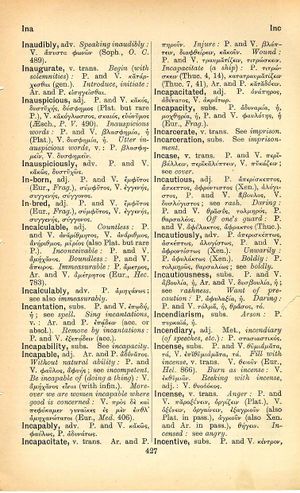incapable: Difference between revisions
From LSJ
(CSV4) |
m (Woodhouse1 replacement) |
||
| Line 1: | Line 1: | ||
{{Woodhouse1 | {{Woodhouse1 | ||
|Text=[[File:woodhouse_427.jpg|thumb|link={{filepath:woodhouse_427.jpg}}]] | |Text=[[File:woodhouse_427.jpg|thumb|link={{filepath:woodhouse_427.jpg}}]] | ||
Ar. and P. [[ἀδύνατος]]. | ===adjective=== | ||
[[Aristophanes|Ar.]] and [[prose|P.]] [[ἀδύνατος]]. | |||
[[without natural ability]]: [[prose|P.]] and [[verse|V.]] [[φαῦλος]], [[ἀφυής]]; see [[incompetent]]. | |||
[[be incapable of]] ([[doing a thing]]): [[verse|V.]] [[ἀμήχανος εἶναι]] (with infin.). | |||
[[moreover we are women incapable where good is concerned]]: [[verse|V.]] [[πρὸς δὲ καὶ πεφύκαμεν γυναῖκες ἐς μὲν ἐσθλ' ἀμηχανώτατοι]] ([[Euripides|Eur.]], ''[[Medea]]'' 406). | |||
}} | }} | ||
Revision as of 08:53, 20 May 2020
English > Greek (Woodhouse)
adjective
without natural ability: P. and V. φαῦλος, ἀφυής; see incompetent.
be incapable of (doing a thing): V. ἀμήχανος εἶναι (with infin.).
moreover we are women incapable where good is concerned: V. πρὸς δὲ καὶ πεφύκαμεν γυναῖκες ἐς μὲν ἐσθλ' ἀμηχανώτατοι (Eur., Medea 406).

